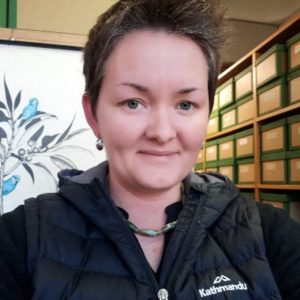Thesis ‘Early and Middle Pleistocene non-passerine bird fossils from the Thylacoleo Caves, Nullarbor Plain’

Sharing her reflections and insights;
Doing research involves so much critical thought that we don’t often get a chance to celebrate what we’ve done well – so I’m very grateful for this added recognition when I was least expecting it.
It means a lot to me that I earnt the respect of my supervisor and examiners who nominated me.
I’m proud of having discovered a number of new extinct species of bird as part of my PhD.
On a personal level, I’m proud that I had enough tenacity to quit my first attempt at a PhD, then go back to square one and start again with a different project. It’s been a long road.
It’s been a real privilege being part of the Flinders Palaeontology lab, including the opportunity to get significant fieldwork experience during my PhD.
I really appreciate being part of such a supportive and egalitarian lab culture, and having the opportunity to learn my trade from senior researchers who do the hard yards and get their hands dirty.
I wanted to study fossil birds, and when I was looking for a project someone told me that Gavin Prideaux at Flinders had just brought back a huge haul of bird fossils from the Nullarbor Plain.
I got in touch and he was really happy to have someone to work on them. I’d met Gavin at a scientific conference the previous year, and was impressed by his willingness to spend time chatting with us students when there were much more important people in the room.
That’s the kind of person you want as a supervisor.
Advice for current or prospective PhD students?
1) Get your eyes tested! I felt rubbish every day for the first two years of my PhD because I didn’t realise I needed reading glasses.
2) If possible, try and spend some time getting to know what your supervisor and their research environment are like by spending time there before you apply. I wish I’d known that the first time I applied for a PhD.
I can’t think of anything more rewarding than immersing yourself in a subject so deeply that you become an expert in it. When I say expert, I mean someone who has learnt enough about their field to realise that they have only just scratched the surface. Enjoy it!
Where are you now?
Currently, I’m doing some project work for the Nature Conservation Society of SA and am loving it.
I’m keeping palaeontology going on the side. Other jobs I’ve done since completing my PhD include conservation work for a private consultancy, writing advertising copy as a freelancer, and I have done a couple of stints as a camp manager in remote South Australia.
I have a number of projects spinning off from my PhD, which I plan to pursue here in the Flinders Palaeontology lab. I want to continue exploring links between palaeontology and conservation.
My main research interest is in what the recent fossil record can reveal about the history of Australia’s fauna, including recent extinctions and declines.
For example, at the moment I am working on the fossil history of the Night Parrot – one of Australia’s rarest and least understood birds.
One of the best parts of my PhD research was getting to share it with a worldwide audience. The work that I and my supervisors published on Australia’s extinct giant megapode birds went somewhat viral, and I had a few surreal days of intense media attention.
After spending a full year squinting quietly at bird bones in a lab, I was very pleased to find that suddenly, hundreds of thousands of people around the world wanted to hear the story these bones told about our prehistory!

